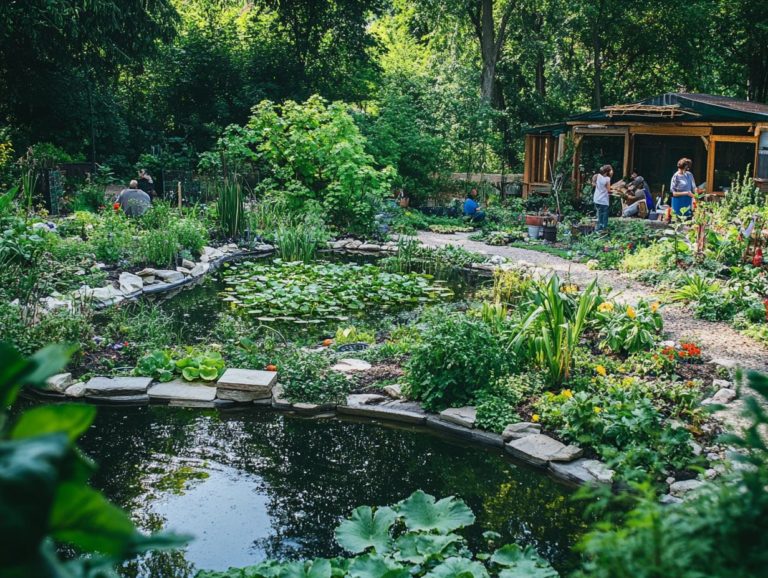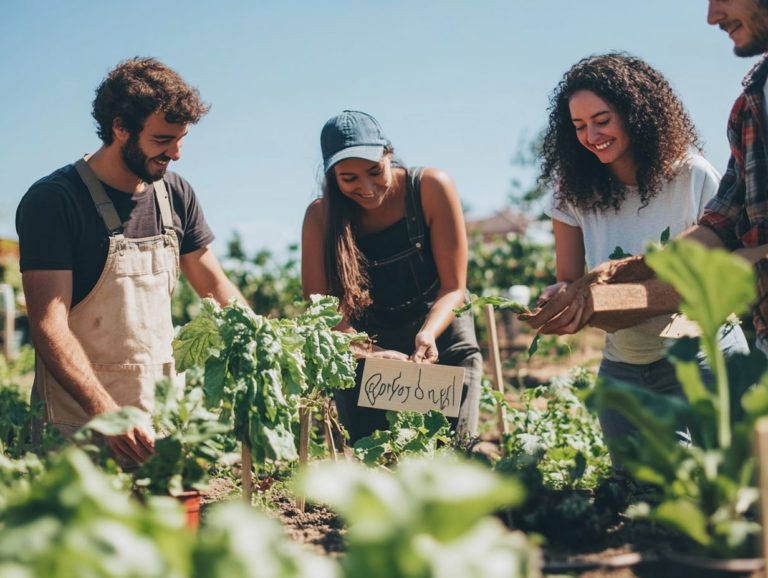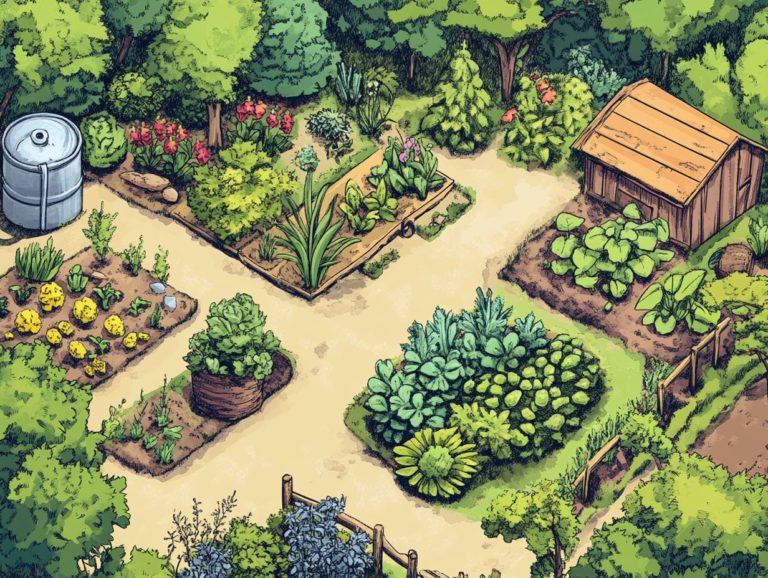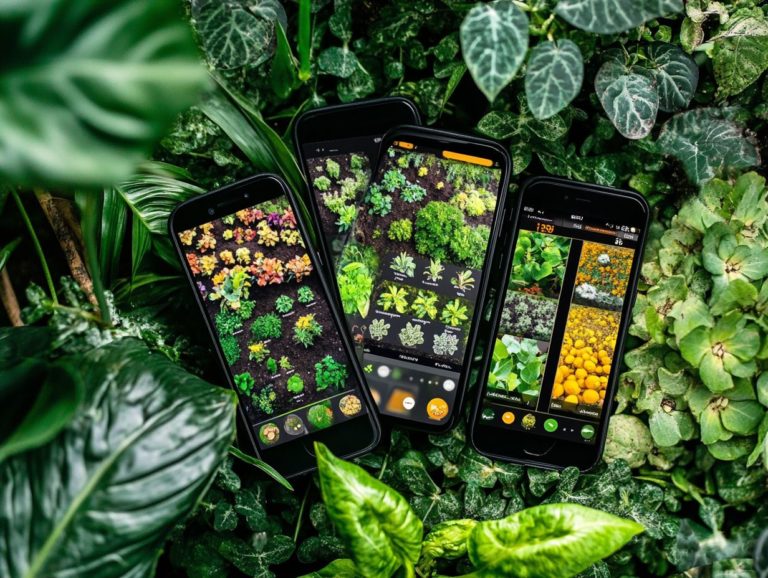9. Essential Tools for Community Permaculture Projects
Permaculture is not merely a gardening technique; it embodies a holistic approach to sustainable living that has the power to transform communities.
Whether you are a seasoned gardener or embarking on your first planting adventure, having the right tools is vital for the success of any permaculture project.
This article delves into 15 essential tools that can enhance your gardening efforts, making them more efficient and enjoyable.
From spades and shovels to protective gear, you ll discover how each tool plays a crucial role in fostering a thriving permaculture system and learn tips for acquiring them within your community.
Excited to transform your gardening experience? Let s dive in and discover the tools that will make it happen!
Contents
- Key Takeaways:
- 1. Spades and Shovels
- 2. Hoes and Rakes
- 3. Pruning Shears and Loppers
- 4. Garden Forks
- 5. Wheelbarrows and Garden Carts
- 6. Irrigation Tools
- 7. Composting Tools
- 8. Mulching Tools
- 9. Hand Trowels and Cultivators
- 10. Soil Testing Kit
- 11. Harvesting Tools
- 12. Protective Gear
- 13. Gardening Gloves
- 14. Garden Kneeler
- 15. Planting Tools
- What Is Permaculture and Why Is It Important for Community Projects?
- Frequently Asked Questions
- What Are Essential Tools for Community Permaculture Projects?
- Why Are These Tools Important for Community Permaculture Projects?
- Where Can I Purchase These Tools?
- Are There Any Alternative Tools That Can Be Used?
- How Can I Ensure These Tools Are Used Safely in a Community Setting?
- Are There Any Eco-Friendly Options for These Tools?
Key Takeaways:
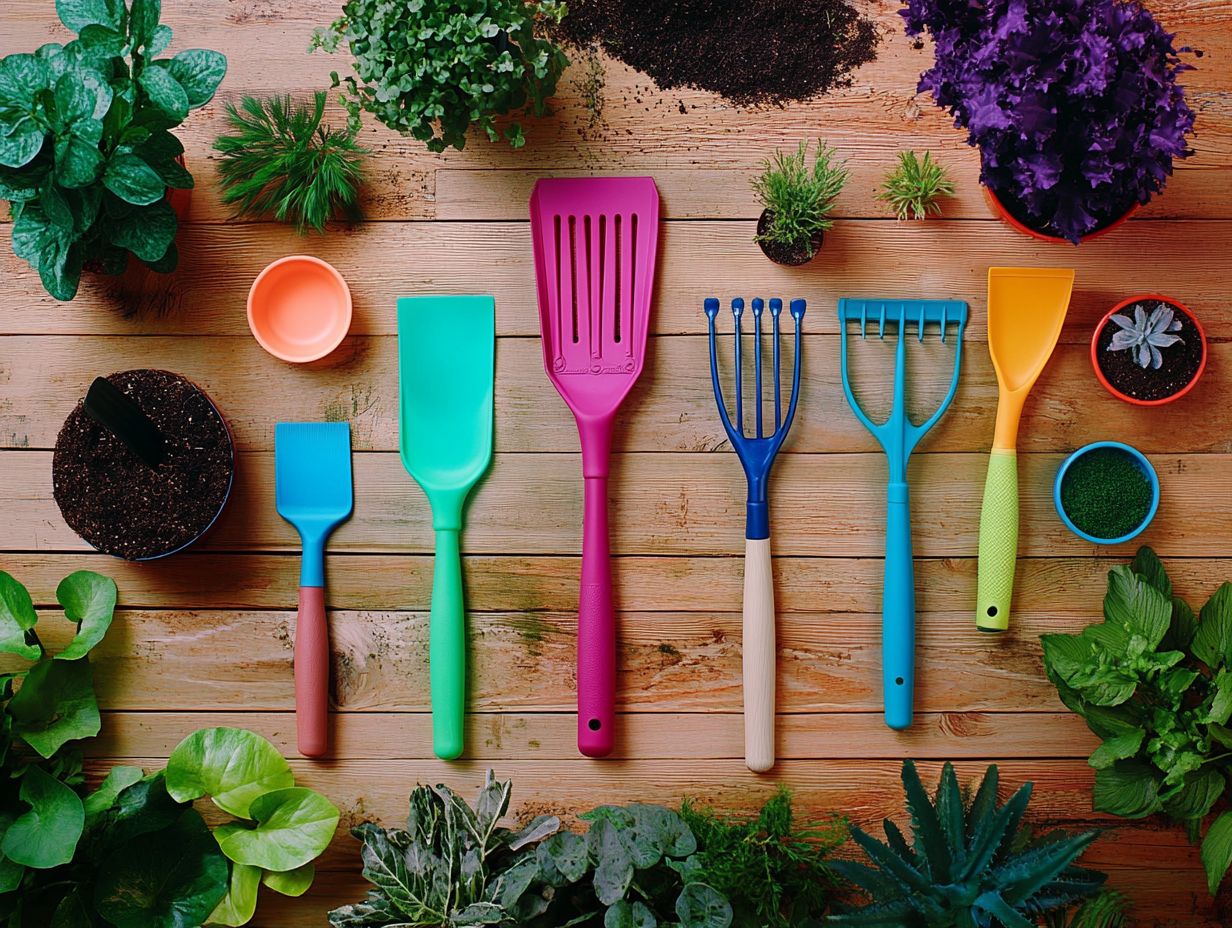
- Proper tools are crucial for the success of community permaculture projects.
- Investing in quality tools can save time and effort in the long run.
- Community involvement and shared resources can help acquire essential tools for permaculture projects.
1. Spades and Shovels
Spades and shovels are essential tools in environmentally friendly gardening, giving you the power to cultivate soil health and boost organic matter, all while embracing sustainable living practices and permaculture principles championed by pioneers like Bill Mollison and David Holmgren.
Spades and shovels break up compacted soil. This allows air and water to reach the roots essential for nurturing thriving root systems. By facilitating the incorporation of compost and other organic materials, spades and shovels help you maintain nutrient levels, enhance moisture retention, and promote microbial diversity. As you engage in alternative farming methods, you recognize the importance of caring for the land, and using these instruments aligns perfectly with broader ecological systems that prioritize biodiversity and sustainability.
Their versatility makes them essential in regenerative agriculture, where the goal is to restore ecosystems while boosting productivity.
2. Hoes and Rakes
Hoes and rakes are essential for maintaining healthy soil and effective composting systems, making them crucial tools for anyone committed to regenerative agriculture and sustainable living.
These tools play a pivotal role in managing weeds easily, allowing you to control unwanted growth without resorting to harmful chemicals. By employing hoes to uproot those pesky weeds and using rakes to gather them up, you actively foster a diverse ecosystem that enhances biodiversity. They significantly improve soil aeration, ensuring that nutrients penetrate deeply and water retention is maximized.
This practice seamlessly aligns with permaculture principles, emphasizing the smart utilization of natural resources while honoring indigenous knowledge and ethical guidelines. By integrating these time-tested techniques, you can cultivate sustainable environments that thrive on ecological balance.
3. Pruning Shears and Loppers
Pruning shears and loppers are essential tools as you maintain food forests and enhancing wildlife habitats. If you’re engaged in environmentally friendly gardening and sustainable food systems, these implements are not just accessories; they’re vital for your toolkit.
These tools do much more than merely cut branches; they help your plants grow healthier and stronger by ensuring adequate air circulation and sunlight penetration. By thoughtfully selecting which branches to prune, you can foster a balanced ecosystem where both flora and fauna flourish.
This practice aligns beautifully with natural building initiatives, as it nurtures local biodiversity and supports community toolbox programs that empower individuals with sustainable gardening skills. In this context, your pruning efforts transform into a vital practice for developing resilient landscapes that benefit both the environment and your local community.
Start your permaculture journey today with these essential tools and watch your garden thrive!
4. Garden Forks
Garden forks are essential tools for enhancing soil health, aerating composting systems, and supporting ecological balance. They play a pivotal role in practices such as permaculture (a sustainable farming method that works with nature) and organic farming.
These versatile implements do more than just turn compost; they help ensure that microbial activity is evenly distributed. This significantly loosens compacted soil for better water retention and root penetration. This capability is especially crucial for self-reliant communities striving to cultivate their own food sustainably. By facilitating the efficient recycling of organic materials into nutrient-rich compost, garden forks empower you to establish alternative energy systems, including compost-powered gardens.
Such practices elevate local food production and strengthen community bonds, fostering resilience and sustainability in an era increasingly threatened by climate change.
5. Wheelbarrows and Garden Carts
Wheelbarrows and garden carts are essential tools that enhance the efficient movement of materials in your gardening endeavors. They champion sustainable living practices and aid environmental restoration efforts.
These versatile implements are crucial for tasks like transporting compost, soil, and plants. They ensure that everything you need to nurture your garden is readily accessible. When tackling large-scale permaculture projects, their efficiency drastically cuts down on labor time. This allows you to concentrate on cultivation instead of the drudgery of manual hauling.
They also elevate community gardening and cooperative farming by simplifying resource sharing and fostering collaboration in creating vibrant green spaces. With wheelbarrows and garden carts at your disposal, you and your fellow community members can unite to enhance local ecosystems and promote sustainable practices. Together, you can make a tangible difference.
6. Irrigation Tools
Irrigation tools, including rainwater harvesting systems, are essential for maintaining ecological systems. They ensure that you have a reliable source of water for sustainable agricultural practices.
Effective irrigation methods like drip systems, swales, and greywater recycling play a crucial role in permaculture design principles. These approaches optimize water efficiency and foster healthier soil and plant life, creating a harmonious balance within the ecosystem.
By integrating such techniques, you can help your community foster self-reliance and empower individuals to cultivate food with minimal environmental impact. Emphasizing sustainable water management enhances variety of plant and animal life and resilience. This underscores the need to adopt innovative tools that align with permaculture values.
Ultimately, the thoughtful use of these resources is vital for nurturing thriving, regenerative landscapes.
7. Composting Tools
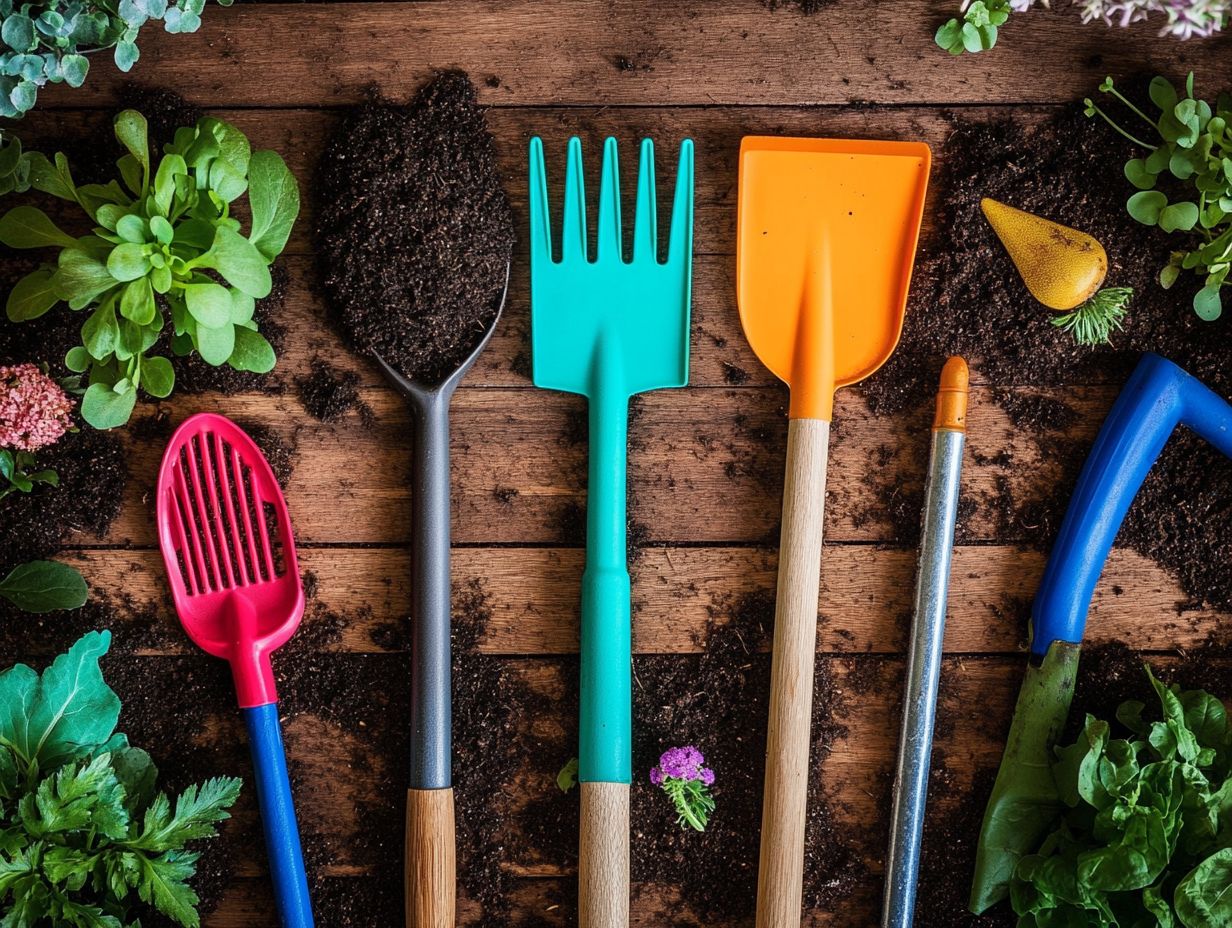
Composting tools actively recycle organic matter back into the soil, enhancing soil health while embodying the principles of ecological gardening and permaculture.
By incorporating these tools, you can embrace a more sustainable lifestyle. Effectively managing your kitchen scraps, yard waste, and other organic materials is key. Understanding various composting methods such as aerobic, anaerobic, and vermicomposting allows you to choose the approach that best aligns with your living space and personal preferences.
These powerful techniques actively promote regenerative agriculture, creating a closed-loop system that fosters variety of plant and animal life and supports soil organisms. When used correctly, composting enriches the soil and underpins holistic gardening practices, nurturing a thriving ecosystem that benefits both your plants and the planet.
Start using these tools today to transform your garden and make a positive impact!
8. Mulching Tools
Mulching tools are essential for you if you want to preserve soil moisture, enhance soil health, and nurture thriving ecosystems. They re crucial in sustainable gardening practices.
By serving as a barrier against weeds, they significantly reduce the competition for vital nutrients and water. Covering the soil also helps regulate its temperature, keeping it cooler in summer and warmer in winter. This natural insulation promotes healthier plant growth and aligns with the principles that promote healthy ecosystems.
Adopting such practices promotes biodiversity and aids in nutrient cycling, enriching the soil over time. Embracing mulching as a gardening technique gives you the power to cultivate resilient landscapes while adhering to the fundamental principles of sustainability.
9. Hand Trowels and Cultivators
Hand trowels and cultivators are vital tools in your small-scale gardening toolkit. They allow for precise planting and optimal soil aeration that bolsters the health of your ecological systems, the systems that support plant and animal life.
These tools shine in maintaining food forests and urban gardens, where a meticulous approach to soil and plant relationships is necessary. Using these tools helps you engage deeply with your environment, fostering a sense of stewardship within your community.
Using hand trowels and cultivators helps you adopt sustainable practices. You not only refine your gardening skills but also become part of a collective vision for local food production. This active participation cultivates a community ethos that cherishes biodiversity and resilience, inspiring a profound connection to nature and a shared responsibility for our ecological future.
10. Soil Testing Kit
A soil testing kit is an essential investment for any gardener looking to understand the details about soil health. It paves the way for effective organic farming and ecological gardening practices.
By accurately measuring factors like how acidic or alkaline your soil is and nutrient content, this invaluable tool gives you the power to evaluate your soil’s fertility and identify potential deficiencies. Understanding these elements is key to determining if your soil is suitable for various plants or if amendments are needed for optimal growing conditions.
With tailored data at your fingertips, you can craft sustainable gardening strategies that allow for targeted interventions. This enhances plant growth while minimizing your environmental footprint. This knowledge supports healthier crops and nurtures a more resilient ecosystem, promoting biodiversity and improving soil structure over time.
11. Harvesting Tools
Harvesting tools are key for efficiently gathering produce, ensuring that your food systems are productive and sustainable within ecological gardening.
You’ll find various types of harvesting tools, including:
- Sickles – Great for cutting grain crops close to the ground.
- Scythes – Ideal for harvesting tall grasses.
- Pruning Shears – Essential for tending to fruit trees and shrubs, promoting healthier yields.
These tools are crucial in self-reliant communities, serving as integral parts of a well-maintained community toolbox. This encourages local stewardship and fosters a culture of resource sharing, supporting the sustainability goals that many communities aspire to achieve.
12. Protective Gear
Protective gear is essential for ensuring your safety while gardening. It allows you to engage in ecological gardening practices with confidence and comfort.
This gear plays a pivotal role in safeguarding you against various hazards from working with soil, plants, and potentially harmful chemicals.
For instance, gloves act as a barrier against thorny plants, while masks protect you from dust and pollen. Eye protection is equally vital, shielding your eyes from flying debris and chemical splashes, creating a safer working environment.
By incorporating these protective essentials, you can cultivate your garden more effectively while prioritizing your personal health and well-being.
13. Gardening Gloves
Gardening gloves are essential for safety and hygiene while working with soil. They protect both you and the ecosystems you nurture.
Explore various types of gloves tailored for different tasks. You can choose lightweight gloves for delicate seedlings or heavy-duty, waterproof ones for thorny plants.
Each glove type serves a unique purpose. Some offer flexibility for gentle weeding, while others provide robust protection for demanding chores.
Choosing the right gloves fosters a safe working environment. It also encourages sustainable habits and a deeper appreciation for the natural world.
14. Garden Kneeler
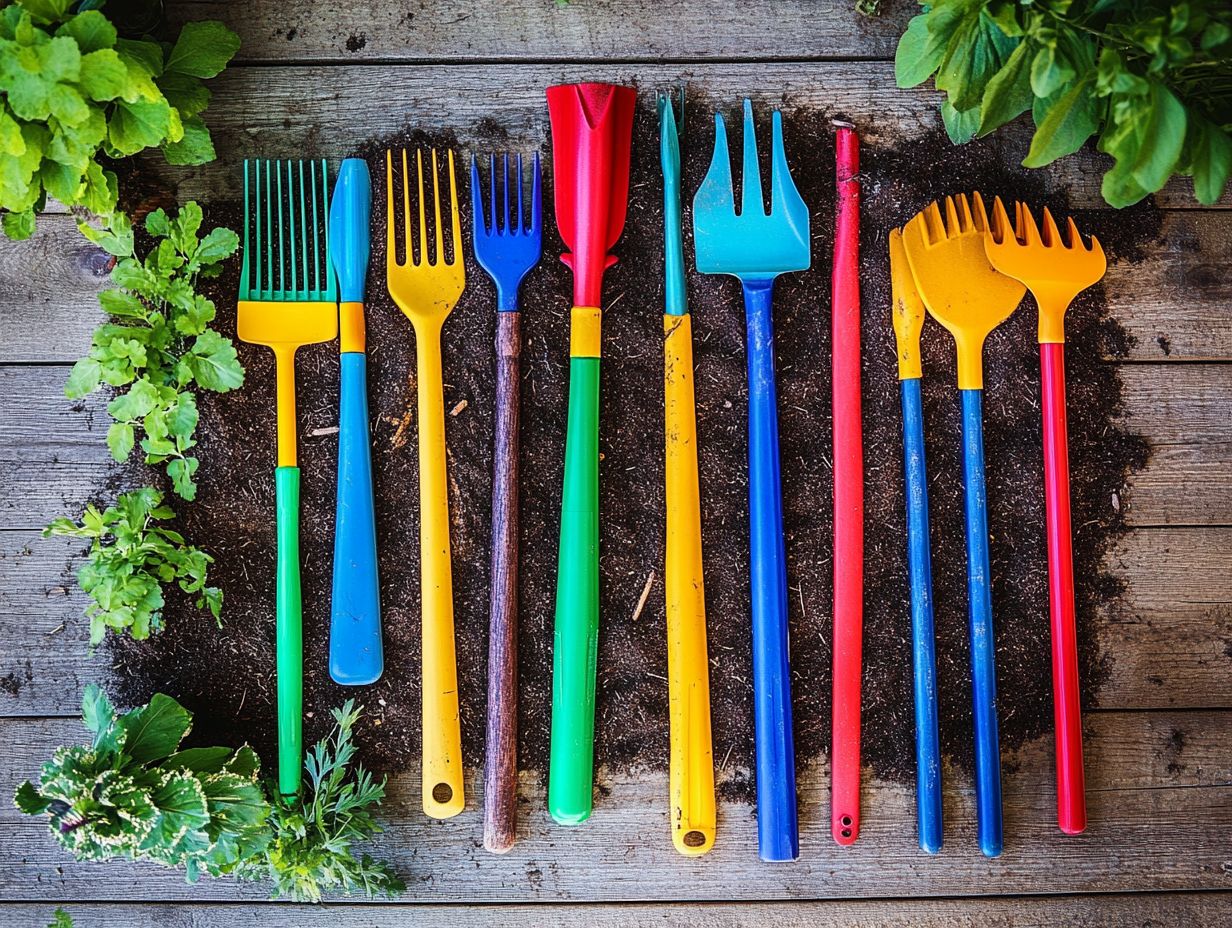
A garden kneeler enhances your gardening experience. It lets you garden longer without discomfort.
This tool transforms the way you work, making it essential for community projects. It helps volunteers focus on planting and nurturing crops without worrying about physical strain.
As more people join the sustainable gardening movement, sharing knowledge cultivates healthier communities. A comfortable environment allows everyone to enjoy nurturing plants.
15. Planting Tools
Planting tools are vital for success in ecological gardening. They help establish food systems that align with permaculture principles.
Using these tools properly enhances soil preparation and fosters biodiversity. Hand trowels, garden forks, and soil augers help you cultivate and aerate the soil.
In community gardening, these tools promote collaboration. They foster a shared sense of purpose focused on sustainable practices.
Eco-friendly tools minimize environmental impact. With the right tools, you can create and maintain healthy, productive gardens that benefit the community.
What Is Permaculture and Why Is It Important for Community Projects?
Permaculture is a complete way of thinking about agricultural design. It creates sustainable and self-sufficient systems, which is key for community projects.
Inspired by pioneers like Bill Mollison and David Holmgren, permaculture combines traditional knowledge with innovative design. This approach helps cultivate local resources, improving food security and environmental stewardship.
When you design urban gardens and community orchards, permaculture encourages sustainable practices. It supports both individual well-being and community growth.
By working with natural systems, you connect more deeply with your environment. This builds a resilient network of support based on shared knowledge and values.
How Can These Tools Help in a Permaculture Project?
Using different gardening tools in your permaculture project can greatly boost productivity and sustainability. This aligns perfectly with ecological gardening principles and community involvement.
Tools like spades and hoes simplify building fertile soil and managing plant growth. Spades dig and aerate the soil, helping roots absorb nutrients better.
Meanwhile, hoes make weeding easier, reducing competition for resources. Composting systems recycle organic waste, enriching your soil while being kind to the environment.
These tools empower you to cultivate your garden and foster self-reliant communities. A shared toolbox encourages collaboration and knowledge exchange among members, enhancing everyone’s gardening experience.
What Are Some Other Essential Tools for a Successful Permaculture Project?
Along with your basic gardening tools, consider soil testing kits and irrigation systems. These game-changers are vital for managing ecological systems effectively.
These tools help you assess soil health and nutrient levels while promoting efficient water usage. Implementing composting systems creates nutrient-rich soil amendments, boosting biodiversity and soil structure.
A well-constructed rainwater harvesting system sustains water availability in dry periods, reducing dependence on external sources.
How Can a Community Acquire These Tools for Their Permaculture Project?
You can get essential tools for your permaculture projects through local tool-sharing programs, donations, and community fundraising. These options align with sustainable living.
By pooling resources, you cut costs while enhancing your group’s capabilities. Neighborhood tool libraries let you borrow everything from shovels to specialized planting devices, promoting efficiency and environmental care.
Initiatives like community potlucks and workshops can fundraise while sharing knowledge and skills. In community gardens, residents cultivate land together, sharing tools and expertise, creating a vibrant ecosystem of support.
What Are Some Common Mistakes to Avoid When Using These Tools in a Permaculture Project?
When you embark on permaculture projects, it s essential to steer clear of common mistakes related to tool usage. Use these tools wisely to maximize your garden’s potential! This approach safeguards your environmentally friendly gardening efforts and enhances the success of your sustainable practices.
Optimizing the effectiveness of your gardening tools is key. It helps you honor the delicate balance of nature that permaculture embodies. For example, if you misuse or neglect tools, you risk soil compaction when soil becomes too packed, making it hard for plants to grow or harming beneficial microorganisms that are critical for healthy plant growth.
By adopting a mindful approach to tool management like performing regular maintenance, selecting the right tool for each task, and properly storing your equipment you can significantly boost both productivity and ecological health. Using these best practices helps you build a better relationship with the environment, ultimately fostering resilience and biodiversity within your garden ecosystem.
Frequently Asked Questions
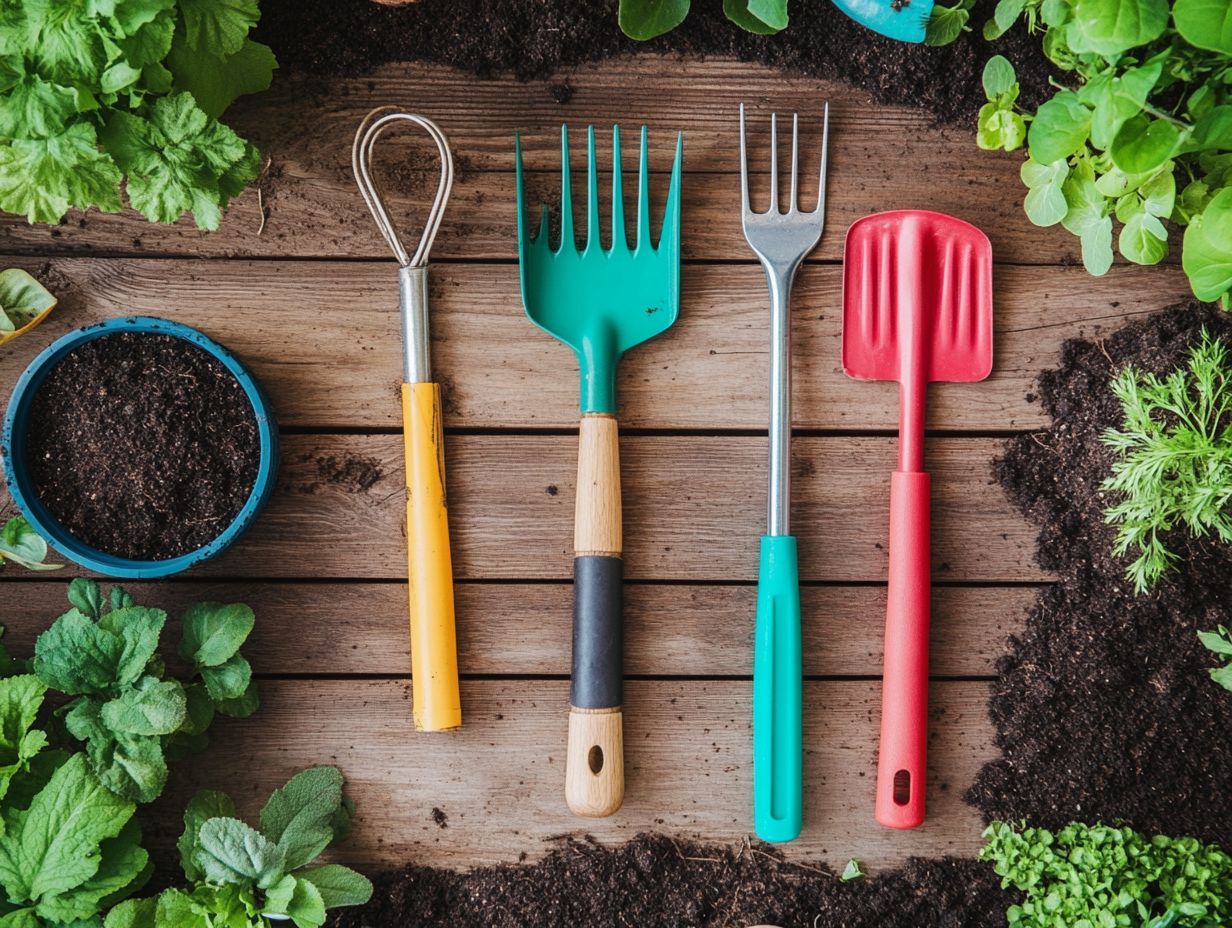
What Are Essential Tools for Community Permaculture Projects?
Essential tools for community permaculture projects include shovels, rakes, hoes, wheelbarrows, pruning shears, and watering cans. These tools play critical roles in regenerative agriculture, which means farming methods that help restore the health of our soil and environment, as highlighted in the power of community in permaculture design.
Why Are These Tools Important for Community Permaculture Projects?
These tools are important for community permaculture projects because they help with tasks such as digging, raking, weeding, pruning, and watering. Understanding the role of community in permaculture design is essential, as these tasks are necessary for maintaining a healthy permaculture garden.
Where Can I Purchase These Tools?
These tools can be purchased at gardening stores, hardware stores, and online retailers. You can also ask local community gardens or permaculture projects if they have any tools available for borrowing or sharing.
Are There Any Alternative Tools That Can Be Used?
Yes, there are alternative tools that can be used for community permaculture projects. These include hand trowels, hand pruners, mulching forks, and hand cultivators.
How Can I Ensure These Tools Are Used Safely in a Community Setting?
To ensure the safe use of these tools in a community setting, it is important to provide proper training and supervision. Establish safety guidelines and regularly inspect and maintain the tools.
Are There Any Eco-Friendly Options for These Tools?
Yes, there are eco-friendly options for these tools. Consider using hand tools instead of gas-powered equipment, choosing tools made from sustainable materials, and utilizing water-saving techniques in gardening tasks.


